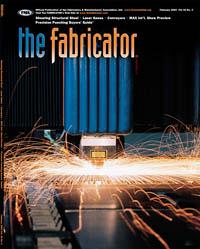Contributing Writer
- FMA
- The Fabricator
- FABTECH
- Canadian Metalworking
Categories
- Additive Manufacturing
- Aluminum Welding
- Arc Welding
- Assembly and Joining
- Automation and Robotics
- Bending and Forming
- Consumables
- Cutting and Weld Prep
- Electric Vehicles
- En Español
- Finishing
- Hydroforming
- Laser Cutting
- Laser Welding
- Machining
- Manufacturing Software
- Materials Handling
- Metals/Materials
- Oxyfuel Cutting
- Plasma Cutting
- Power Tools
- Punching and Other Holemaking
- Roll Forming
- Safety
- Sawing
- Shearing
- Shop Management
- Testing and Measuring
- Tube and Pipe Fabrication
- Tube and Pipe Production
- Waterjet Cutting
Industry Directory
Webcasts
Podcasts
FAB 40
Advertise
Subscribe
Account Login
Search
Emotional thrills
Is your job shop more fun than a roller coaster?
- By Gerald Davis
- February 28, 2002
- Article
- Shop Management
Job shops experience many ups and downs. The key is to try to avoid the downs.
I've studied job shops for years, my own in particular. In general, job shops are exceptionally skilled in one or two areas. One or two customers drive the business, and almost everything else is fill-in work. And one or two victories every year keep you coming back for more.
Your shop was founded by someone who was great at something. It could have been squeezing precision out of an old, manual knee-bed mill; mastering flow rates and draft angles in injection mold tooling; or bending tubing in impossible ways. In the first year of operation, your founder gained immeasurable joy from seeing the customer's delight with the delivery. The customer's praise was almost better than money.
A few shops are blessed with founders who also are great accountants. More than a few, however, regard quoting, billing, and recordkeeping as nothing more than a necessary chore. In the beginning the exceptional skill of the shop allows for generous margins, but over time generous margins beget competitors. In short order the profit margins get really tight.
A few shops are blessed with a diversified customer base. Most of my company's customers manufacture equipment that is electronic to one degree or another. The industries they focus on include food processing, vending machines, power supplies, and robotics. When one industry is booming, the other might be regrouping in research and development. The result we're looking for is stable sales, even though the "hot" customer list changes monthly.
Your main task is to make your customer succeed. Eventually one or two of your clients will boom beyond all expectation. You can't really say no to them, either. You grew up together. You understand what they want, as opposed to what their engineering documents say. The pricing is pretty good, and the increase in sales is just great. All of a sudden those couple customers represent more than half of your sales.
You might try increasing sales with customers in other industry segments, but they need short runs or quick turns, and your shop is too busy serving that big guy. Your customer list shrinks, and the problem gets worse instead of better.
The big guy slows down, so you rush to bring in new clients. They're growing fine, but when the big guy picks back up, you have to work overtime, start another shift, buy more machines, or expand the building. Profit? What profit? All you have are sales and cash flow. New hires don't know the founder or really understand the core skills that made the shop such a success to start with. Scrap becomes excessive.
The founder will go through a metamorphosis from hands-on genius to snarling ogre to legend and myth. The last stage happens after burnout or retirement; the second generation of management puts him on a pedestal that all can reference as the focus and vision of the organization.
With all of this internal crud going on, you still ship great product to very happy customers. A few of them send you awards or certificates of achievement. You get your estimating system fixed and stabilize your margins. The apprenticeship program works, and your staff skill blossoms. You actually have employees who are better at the job than the founder ever was.
The third or fourth generation of machinery gets installed, and your company is recognized as a community leader. The business has transformed itself from a one-person hobby to a multimillion-dollar operation regarded by many as a key in the industry network.
Success in the job shop business is tough to measure. Survival is its own reward. The other day one of our customers called me and raved about something we just did. Goodness, I love this business!
I'd like to hear about how you deal with emotional roller coasters.
About the Author
Related Companies
subscribe now

The Fabricator is North America's leading magazine for the metal forming and fabricating industry. The magazine delivers the news, technical articles, and case histories that enable fabricators to do their jobs more efficiently. The Fabricator has served the industry since 1970.
start your free subscription- Stay connected from anywhere

Easily access valuable industry resources now with full access to the digital edition of The Fabricator.

Easily access valuable industry resources now with full access to the digital edition of The Welder.

Easily access valuable industry resources now with full access to the digital edition of The Tube and Pipe Journal.
- Podcasting
- Podcast:
- The Fabricator Podcast
- Published:
- 04/16/2024
- Running Time:
- 63:29
In this episode of The Fabricator Podcast, Caleb Chamberlain, co-founder and CEO of OSH Cut, discusses his company’s...
- Industry Events
16th Annual Safety Conference
- April 30 - May 1, 2024
- Elgin,
Pipe and Tube Conference
- May 21 - 22, 2024
- Omaha, NE
World-Class Roll Forming Workshop
- June 5 - 6, 2024
- Louisville, KY
Advanced Laser Application Workshop
- June 25 - 27, 2024
- Novi, MI
































